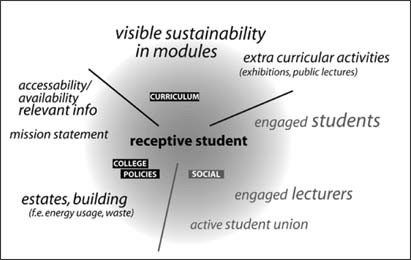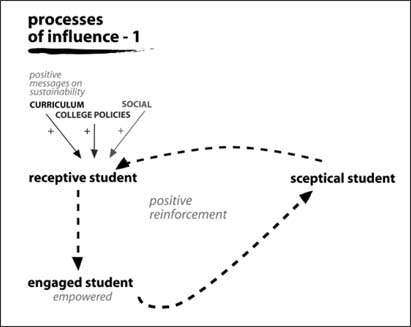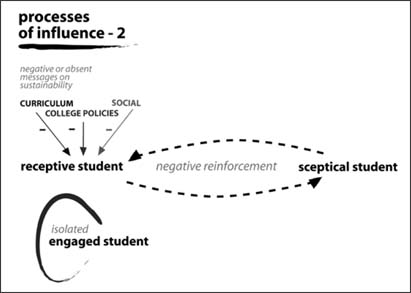Abstract
Particularly since the launch of the United Nations Decade of Education for Sustainable Development (DESD) in 2005, sustainability has become a key concept in government policies. The Department for Education and Skill (DfES) and the Learning and Skills Council (LSC), amongst others, are looking to educators to take the lead in integrating these issues in the curriculum. Although a lot of valid research about what sustainable development means and how it should be embedded in education has been published, it still remains unclear how teachers and lecturers should be convinced of the importance of sustainability, and how students could be engaged with an issue that is not necessarily clearly linked to their subject of study or a successful career. Although lecturer and student commitment cannot be separated completely, I focus in this article on the latter since universities and colleges cannot claim to promote sustainability if student engagement is not considered seriously. Over the last four months I have worked with student focus groups at University of Plymouth (UoP) Colleges to find out how students engage with sustainability and what colleges should do to encourage it. As the research is still ongoing it is too early to draw strong conclusions, however clear themes are emerging from the discussions, which are interesting enough to publicise in the hope of starting a debate on student engagement in sustainability.
Introduction
As one of many sustainability championsFootnote * at Somerset College, I have been involved with institutional change towards a sustainable college and curriculum and have experienced a significant difference in levels of commitment amongst staff and students. A recent survey amongst UoP staff reveals that about 45% of the participating lecturers considered including elements of sustainable development in their teaching in the coming year. The researchers nonetheless conclude that:
Support from lecturers can by no means be taken for granted. Academics are likely to resist attempts to impose an ESD agenda which does not take their views into account, hence the importance of research which considers the extent to which lecturers feel ESD is a worthwhile and appropriate addition to the HE curriculum (CitationBissell et al, 2006).
These figures might look disappointing to some, but it must be said that there is often confusion about the concept and meaning of sustainable development, as often ‘sustainability’ is confused with ‘eco-friendly’. As recommended in the Earth Charter (2000), the declaration of fundamental principles for building a just, sustainable and peaceful global society, there are four main values that underpin a sustainable future:
Respect and care for the community of life; ecological integrity; social and economic justice and democracy and non-violence and peace. (The Earth Charter initiative, 2000)
Because inclusion and equality are very much a part of University culture and embedded in the curriculum, one could argue that most lecturers are using at least a few of the principles in their teaching without at times being aware of it.
To be clear about my own view on Education for Sustainable Development, I would like to use the meaning that the original instigator of the DESD, Daisaku Ikeda (2003), has attributed to it. He has three main goals in mind:
To learn and deepen awareness of environmental issues and realities
To reflect on our modes of living, renewing these towards sustainability
To empower people to take concrete action to resolve the challenges we face (CitationIkeda, 2003)
Students’ voice
As a Graphic Design and New Media lecturer, I was particularly interested in the effectiveness of communication about sustainability. To engage with students it is important to understand what matters to them. Adolescents and young adults have different priorities and different worries from middle-aged lecturers; they tend to fret more about short-term problems and relationships. Moreover, each generation has different cultural baggage. Current students have been brought up with mobile phones, the Internet and 24/7 television. This has influenced the way they communicate and absorb information. My generation - I was born in the sixties - had to rely on books or other printed publications for information. If you were lucky you had a good library in close proximity. Today, students have infinite amounts of information accessible at the click of a ‘mouse’, but yet it seems more difficult for them to find the information they need.
To get a picture of how ESD is communicated with students across UoP Colleges, I found three colleges prepared to collaborate—Somerset College, University of Plymouth at its Exeter campus and Cornwall College (Camborne). All students are Art & Design students because it is my own subject area, however they could have been from any study subject. The participating students are not necessarily pro-sustainability and mature students were included to get a complete picture.
All students were asked to participate with an on-line survey. The purpose was to find interesting patterns in the answers. The questions were drafted to find out more about general level of engagement, empowerment, future expectations, fears and influences on thinking and behaviour. Because only a small number of students are participating, no hard conclusions can be drawn from the answers, but they did provide me with data that led to discussion topics. For example, I noticed that impact of ‘climate change’ was more often discussed at home than at college. Why?
Students from all these initiatives suggested that at home triggers for discussion such as the evening news are readily available, while at College such triggers for debate are absent. It was also mentioned that being at University, a new social environment caused insecurities about the appropriateness to discuss ‘political’ issues. Since the colleges did not offer the discussion, students did not want to rock the boat.
This point enticed me to discuss in more detail the function of triggers at colleges, and together we drafted a list with turn-ons and turn-offs. Most students felt strongly that colleges should show in practice that they care about sustainability and that it should not be just theory. For example, they would like to have recycling boxes in their studios and workshops. Although acknowledging that recycling is a last resort, they wanted to be able to make a personal contribution to a more sustainable world. It would also signal that the college is taking environmental issues seriously.
Lack of communication about sustainability was also mentioned as a negative influence. Just like UoP lecturers, most students thought that sustainable means eco-friendly. They would like to see mission statements about sustainability with a clear description of what it means. It was very interesting to find that only one student at Somerset College mentioned the Genesis Project as a positive influence. The Genesis building at Somerset College, opened in 2006, is beautifully designed, is made from a variety of sustainable materials and is powered by renewable energy sources. It functions as an example for the construction industry and as a hub for a range of sustainability themed educational, business and cultural activities in the South West. When asked, the students told me that they were not aware that there was such a unique building on the campus. What happened? Somerset College put posters up around the college, send e-mails round to staff and organised open days…So the students did not read the posters and the staff did not read the e-mails? As Lucretius observed a mere 2000 years ago:
Even in the case of things which are clearly visible, you know that if you do not turn your mind to them, it is as though they had never been there or were far away. (CitationLucretius, IV 1994)
Not enough minds were turned to this important development at Somerset College. Giving out information is clearly not the same thing as actually engaging people with information or making information sticky as Malcolm Gladwell explains in his bestseller “The Tipping Point”:
By tinkering with the presentation of information, we can significantly improve its stickiness. Simply by finding and reaching those few special people who hold so much social power, we can shape the course of social epidemics. (CitationGladwell, 2000)
The students in the Exeter group mentioned that their lecturers are playing an important role in engaging them with sustainability and are making information about it sticky through their enthusiasm. It stimulates them to investigate the meaning of sustainable development and the relevance to their subject area of product design. At the other colleges where that enthusiasm is less clearly expressed, it is not only leaving students indifferent, but also making engaged students feel insecure.
Another important positive influence on the students in Exeter was that there is a clear element of sustainability within some of the taught modules. Although they would like to see it extended to all modules, they had clearly taken it more to heart than their fellow students at Somerset College and Cornwall College. Still there were insecurities about the place of sustainability in their professional career as product designers and doubted whether they should put a lot of energy into it whilst they are at college. As one of the students remarked:
at our course sustainability is not linked to success as a student or as a professional. We are already very busy with our set course work, why would we put effort into taking sustainability into account?
Areas of influence
Through various discussions with the students I was able to identify three different groups of students, and three principal areas of influence on student engagement. As a student enters University, he or she is already engaged with sustainability issues, is neutral/receptive, or is indifferent/negative. The student’s attitude is consequently challenged or reinforced by three areas of influence: the curriculum, college policies, and social or personal influences ().
It is important to understand that we are all very much influenced by our social environment and that young adults are very susceptible to peer pressure. Gladwell argues that contrary to the way we would like to see ourselves, autonomous and inner-directed,
we are actually powerfully influenced by our surroundings, our immediate context, and the personalities of those around us.
Engaged students, therefore, have an important role to play in introducing the concept of sustainability into their subject of study. My survey confirmed the influence of peers on the level of commitment to a sustainable lifestyle. The students were more influenced by people in their close social environment, such as parents, housemates and boyfriends than by the news or other media. shows that receptive students are open to positive communication about sustainability and how they become engaged and empowered students. When they are empowered they will be able to influence sceptical students, who will then become receptive to positive communication at university.
However, if there is negative or lack of positive communication about sustainable development, the engaged student may become isolated and disempowered (Figure 3)
21st Century communication
Since 21st century students access and absorb information so differently, the second phase of my research will focus on how UoP Colleges can help students to make it easier to link sustainable development to their own studies and to approach their subjects in a more holistic way through linking it with other subject areas. Holistic thinking is important to understand the complexity of the global problems we are facing today, as well as a necessity to find solutions. As the deep-ecologist David Orr argues:
We educate many in-the-box thinkers who perform within their various specialities rather like a dog kept in the yard by an electronic barrier. And there is a connection between knowledge organised in boxes, minds that stay in those boxes, and the inability of those minds to perceive the causes of degraded ecologies and global imbalances (CitationOrr, 1994:7)
Together with the UOP’s of Excellence (CETL) in Education for Sustainable Development (ESD) called the Centre for Sustainable Futures and the student focus groups, I am working on an open source website for UoP students, where they can post their ideas related to sustainability; showcase work; find information about local sustainable resources, pod and video casts; and much more. Linking all subject areas together will promote holistic thinking and problem solving. We will also introduce a ranking system to make it easier to navigate through the vast amount of sustainability-related websites that are already on the World Wide Web.
At Somerset college, having learned from what the students in the focus groups have told us, we are now working together to engage students better with sustainable development. At the same time, staff have been involved with strategic planning through participation with ‘World Café’Footnote ** sessions in which they had the opportunity to have their voice heard and to exchange ideas with a variety of colleagues from caretakers to governors. It is not a quick fix, but the rocky and exiting journey towards a more sustainable college is on course and I am hoping to share what we learn on the way with all UoP Colleges and more widely.
Notes
* The sustainability champions are self-selected volunteers who are passionate about the development of sustainability at Somerset College. They have received support and training to tackle sustainability issues at grass-roots level
** A process for leading collaborative dialogue and knowledge-sharing, especially in large groups
References
- BaileyI., BissellS., CottonD., WarrenM., and MaiborodaO. (2006) Transforming an institution: Integrating Sustainable Development into Teaching and Learning in Higher Education (UoP, CSF) unpublished
- IkedaD. (2003) Seeds of Change: A Proposal on Education for a Sustainable Future, (Tokyo, SGI)
- GladwellM. (2000) The tipping point, how little things can make a big difference, London, Little, Brown and Company)
- LucretiusT. (1994) On the nature of the universe IV, (Cambridge, Penguin Classics)
- OrrD. (1994) The Marriage of Mind and Nature, Resurgence, September / October, pp 6-7


